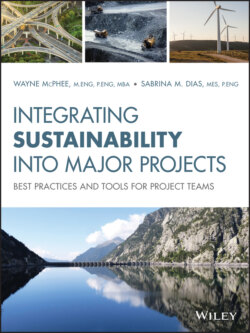Читать книгу Integrating Sustainability Into Major Projects - Wayne McPhee - Страница 2
Table of Contents
Оглавление1 Cover
2 About the Authors
3 Acknowledgments
4 CHAPTER 1: Introduction 1.1 Terminology 1.2 Creating Value by Integrating Sustainability 1.3 Creating a Sustainability Focus 1.4 Sustainability Is a Team Sport 1.5 Who Is This Book For? 1.6 How to Use This Book Endnotes
5 CHAPTER 2: Overview of Major Projects 2.1 What Is a Major Project? 2.2 Types of Major Projects 2.3 Types of Project Structures 2.4 Key Players 2.5 Managing Time and Space 2.6 Project Lifecycle 2.7 Summary
6 CHAPTER 3: Standards and Guidelines 3.1 Getting Started 3.2 International Standards and Guidelines 3.3 Industry Guidelines 3.4 Discipline Guidelines 3.5 Responsible Project Financing 3.6 Sustainable and Responsible Investing 3.7 Managing Standards and Guidelines 3.8 Summary Endnotes
7 CHAPTER 4: Understanding What Is Important 4.1 Mapping Sustainability Topics 4.2 Mapping External Factors 4.3 Value Chain Analysis 4.4 Focus on Materiality 4.5 Summary Endnotes
8 CHAPTER 5: Project Management 5.1 Sustainability Steering Committee 5.2 Project Charter 5.3 Sustainability Policy 5.4 Project Goals 5.5 Structuring the Project Organization 5.6 Project Execution Plan 5.7 Project Schedule 5.8 Project Communications Plan 5.9 Change Management 5.10 Project Team Roles and Responsibilities 5.11 Summary
9 CHAPTER 6: Stakeholder Engagement 6.1 Reasons to Engage 6.2 Identifying Stakeholders 6.3 Understanding Project Stakeholders 6.4 Engaging 6.5 Documenting Engagement 6.6 Communicating 6.7 The Stakeholder Engagement Plan (SEP) 6.8 Community Agreements 6.9 Additional Tools 6.10 Summary Endnote
10 CHAPTER 7: Managing Risk and Opportunity 7.1 Risk Workshops 7.2 Project Risk Register 7.3 Risk Management Plans 7.4 Opportunity Management 7.5 Summary
11 CHAPTER 8: Sustainability Management Tools 8.1 Sustainability Integration Framework 8.2 Management Systems 8.3 Managing Commitments 8.4 Developing a Commitments Action Log 8.5 Managing Complaints 8.6 Developing a Complaint Mechanism 8.7 Monitoring Sustainability Performance 8.8 Summary Endnotes
12 CHAPTER 9: Approvals and Permits 9.1 Approvals 9.2 Permits 9.3 Summary
13 CHAPTER 10: Design 10.1 Design Basis 10.2 Selecting a Location 10.3 Community Design Workshops 10.4 Innovation 10.5 Decision Making 10.6 Designing for Climate Change 10.7 Summary Endnotes
14 CHAPTER 11: Procurement 11.1 Procurement Plan 11.2 Economic Development Plan 11.3 Equipment and Materials 11.4 Supplies and Services 11.5 Logistics 11.6 Contractors 11.7 Summary Endnotes
15 CHAPTER 12: Construction Management 12.1 Transition to Construction 12.2 Stakeholder Communications During Construction 12.3 Public Safety 12.4 Environmental Management 12.5 Working with Contractors 12.6 Permit to Work System 12.7 Construction Sustainability Metrics 12.8 Creating a Sustainability Culture 12.9 Summary Endnote
16 CHAPTER 13: Commissioning 13.1 Commissioning Team 13.2 Management Systems 13.3 Stakeholder Engagement 13.4 Communications 13.5 Completion and Demobilization 13.6 Summary
17 CHAPTER 14: Closure 14.1 Closure Planning 14.2 Transition to Closure 14.3 Design for Closure 14.4 Progressive Reclamation 14.5 Summary
18 CHAPTER 15: Wrap-Up It's a New World for Delivering Major Projects So, What Can Project Teams Do? Managing Complexity What Does It Cost? Getting Started Sharing Your Stories Final Word
19 APPENDIX A: PESTLe Table of External Factors
20 APPENDIX B: Stakeholder Summary Template
21 APPENDIX C: Stakeholder Engagement Plan Sample Table of Contents
22 APPENDIX D: Stakeholder Communications Planning for Construction
23 Index
24 End User License Agreement
